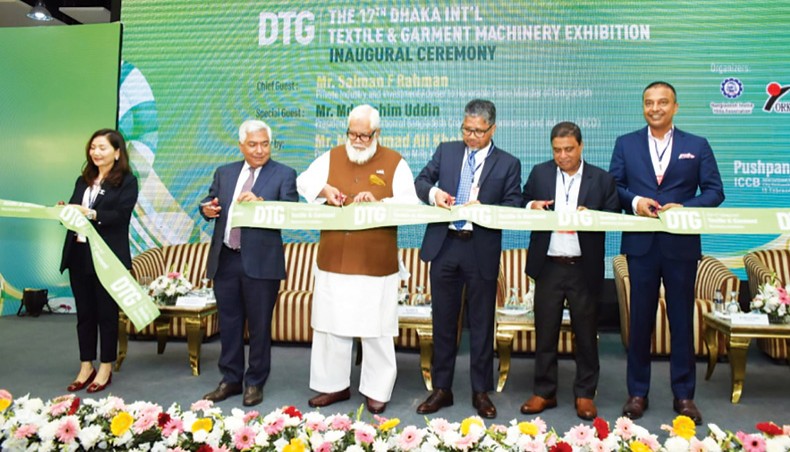Textile machinery suppliers see big business in Bangladesh
27 February, 2023

Global suppliers of textile machinery see a huge potential to grow their business in Bangladesh as international fashion brands are shifting huge quantities of orders to the country from China.
The international capital machinery suppliers, who are taking part in the Dhaka International Textile and Garment (DTG) 2023, said that despite the Covid blow, their business witnessed an encouraging growth in Bangladesh in the past three years.
At the inaugural ceremony of four-day DTG-2023 at the International Convention City Bashundhara in the capital Dhaka on Wednesday, they said that the demand for machinery for producing manmade-based fibre and fabrics was growing in Bangladesh as local investors were putting huge investments in non-cotton textiles.
‘Bangladesh is a good market for my company as the business of my company grew even in the time of Covid-19,’ said Gianpiero Valsecchi, sales area manager of Santoni, an Italian textile machinery producer which also operates in China.
In the past two years, business grew 40 per cent year-on-year in Bangladesh despite having the Covid impacts because a lot of businesses booked for machinery online as they could not travel abroad due to the pandemic, he said. Bangladesh will continue to grow its textile and garment business as global clothing retailers and brands are shifting their work orders to the country from the other countries, he said.
Thomas Streicher, area sales and product manager of German machinery company Trutzschler, said that Bangladesh was one of most potential markets for his company as the international retailers and brands were coming Bangladesh with a lot of work orders.
Bangladesh has the advantage of competitive labour force, he said.
‘We delivered a lot of machines here and we are very much optimistic that Bangladesh market will grow a lot in future,’ he said.
‘No doubt, Bangladesh is top destination for my company as the sales are increasing with high demand from customers,’ said Ikuto Umeda, chief executive officer of Shima Seiki (Hong Kong) Ltd.
Shima Seiki supplied 20,000 units of machinery to 200 Bangladeshi customers over the past seven years.
Despite a lot of challenges, the business is growing for his company in Bangladesh, although the growth slowed down, he added.
Akai Lin, overseas director of Chan Chao International Co, the organiser of the exhibition, said that his company held the machinery exposition in Dhaka first in 2004 and then Bangladesh was the fourth largest apparel supplier worldwide and now the country was the second largest garment exporter which indicated the strength of the sector.
The demand for the machinery of manmade fibre is growing in Bangladesh as the local entrepreneurs are putting a lot of investments in the manmade fibre industry to grab more market share, he said.
Judy Wang, executive director (overseas) of Chan Chao International, said that some 1,200 companies from 35 countries were participating in the four-day event.
At the inaugural event, Salman F Rahman, private industry and investment adviser to the prime minister, suggested that the local entrepreneurs should invest more in manmade fibre.
Of the total garment trade worldwide, 70 per cent is made of manmade fibres, but Bangladesh’s 90 per cent of garment products is made of cotton and cotton-mixed fibres, he said.
So, Bangladesh has a good opportunity to invest in manmade fibres, he said.
‘The rising prices of gas and electricity are affecting investments in the textile and garment sectors in Bangladesh,’ he said.
Md Jashim Uddin, president of the Federation of Bangladesh Chambers of Commerce and Industry, said that Bangladesh had an export target of $300 billion worth of merchandises by 2041.
Innovative and sustainable garment items would help the country in achieving the target, he said.
Mohammad Ali Khokon, president of the Bangladesh Textile Mills Association, thanked the government for taking measures for importing liquefied natural gas to address the energy issues in the country.
Useful Links:
Source: www.newagebd.net
TAG(s):
